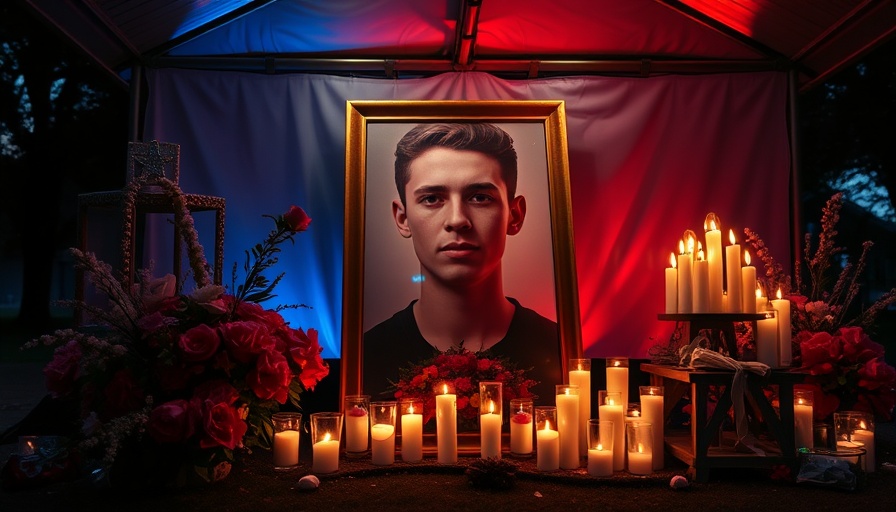
Grasping the Political Context Behind the Recent Shooting
The recent arrest of suspect Tyler Robinson sheds light on a troubling episode that has reverberated through both local and national political landscapes. Following the death of political commentator Charlie Kirk, labeled a targeted attack, discussions surrounding political violence are becoming increasingly urgent.
In 'Charlie Kirk shooting suspect caught, says Trump,' vital discussions surrounding political violence emerge that we're now elaborating on in this article.
This incident unfolds against a backdrop where the polarization of the political sphere may contribute to a dangerous environment for public figures. The swift identification and apprehension of Robinson underscores the pivotal role of proactive law enforcement in averting further crises while raising questions about the broader systemic issues that may have fostered such an act of violence.
Examining the Ramifications of Political Targeting
This shooting raises essential questions about the safety of political figures, particularly in turbulent climates where dissent is often met with hostility. The perception of political violence as a tool for silencing dissent needs to be addressed directly. Each act of violence against a public figure, especially in political arenas, shifts the landscape in ways that go beyond individual tragedy, implicating national stability.
Moreover, the implications extend to the dialogue surrounding free speech. Are certain individuals becoming targets simply for voicing unpopular opinions? Engaging in this discussion opens a pathway towards understanding the broader societal factors that contribute to political violence.
Public Response and Community Safety
The public response to Charlie Kirk’s tragic death has shown a mixture of outrage and concern. Local authorities have emphasized the need for community vigilance, but the rhetoric surrounding political assassinations necessitates careful examination. The word ‘assassination’ evokes stark emotions and calls into question what mechanisms in society permit political targeting to escalate to violence.
Following the incident, citizens rallied around a message urging officials to enhance community safety effective immediately. While the law enforcement community works to secure public figures, it also opens up vital dialogue about grassroots movements and community involvement in tackling such threats proactively.
Concerns Over Media Narratives in the Wake of Violence
The role of the media cannot be overstated in shaping narratives following politically charged incidents. As journalists delve into the details of the case, reporting must remain balanced and responsible. Amplifying narratives that suggest a broad conspiracy without evidence can not only further inflame tensions but may also lead to direct harm to individuals or groups wrongly implicated.
As the media landscape flourishes with diverse perspectives, audiences are encouraged to engage critically with the information they consume. Honest reporting is essential to restoring trust in institutions and dissuading extremism from both ends of the political spectrum.
The Urgency for Systematic Change in Political Discourse
The prevalence of violent actions directed against political figures calls for introspection within the political system. To quell the tides of violence, there must be a collaborative approach across all political factions. The stakes are too high for divisive and incendiary rhetoric to define political discourse.
Programmatic solutions aimed at fostering constructive dialogue should be prioritized. Civic engagement programs, educational initiatives on political history and rhetoric, and the role of empathy in understanding differing viewpoints can be pivotal in preventing future violence. In addition, political leaders must take accountability for their language and actions that could incite public unrest.
The Broader Implications for African Politics
As the world observes this incident, it’s vital to draw connections to ongoing issues within the African continent. Political violence in various regions reflects a shared global concern that transcends borders. Issues of governance, accountability, and civil unrest are prevalent in many African nations, where the implications of violent political cultures can lead to systemic failure.
The urgency for African leaders to address these challenges cannot be overstated. Drawing from developments in the West, African nations have an opportunity to implement restorative initiatives and policy measures aimed at eradicating political violence and enhancing public trust.
A Call for Action in Preventing Political Violence
With the arrest of Tyler Robinson behind us, citizens and leaders must collectively lean into preventing future acts of violence. This situation isn't just about the tragic death of one individual; it highlights the fragility of political discourse globally. Therefore, let us engage in conversations about sustainable political practices that promote inclusive dialogue and safety for all public figures.
Awareness and active participation can alter the narrative surrounding political discourse, ensuring such tragedies are not repeated. As informed citizens, it is our prerogative to demand accountability and safety in political spaces.
 Add Row
Add Row  Add
Add 




Write A Comment